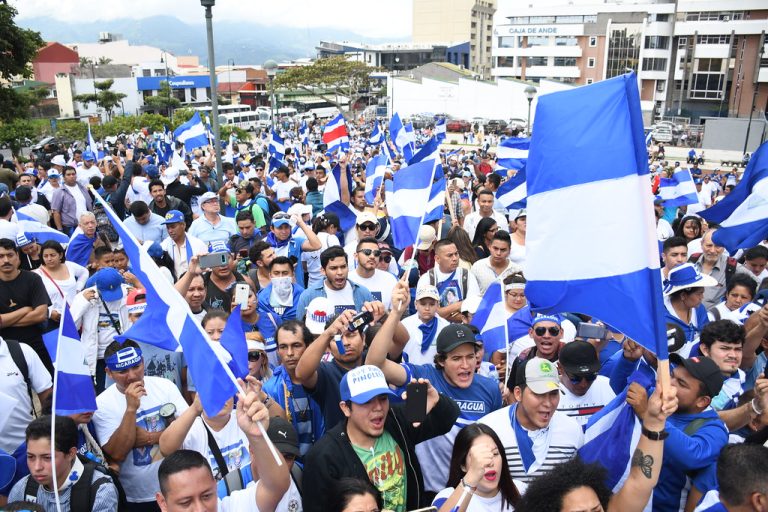30 de diciembre 2019

The Return of the Military

PUBLICIDAD 1M
PUBLICIDAD 4D
PUBLICIDAD 5D
Nearly 100,000 Nicaraguans have taken refuge in Costa Rica, USA, Panama, Spain and other countries.

Nearly 100,000 Nicaraguans have taken refuge in Costa Rica, USA, Panama, Spain and other countries. The Confidencial editorial board selects them: people of 2019Elmer Rivas | Confidencial
It is time for end of the year holidays. A group of young people diligently organizes to celebrate them: “la Purísima” (Immaculate Conception), Christmas and a New Year. They are Nicaraguan exiles in Costa Rica.
In a rush to crunch the numbers to achieve the miracle of multiplying bread and fish, they seek to give gifts and typical foods to other Nicaraguans who also find themselves in exile in this country. Maybe, “nacatamales”(corn dough stuffed with pork or chicken, wrapped in plantain leaves and steam-cooked), if there is enough budget.
More than a year has gone by since they left their homes unexpectedly, after their participation in the protests against the regime of Daniel Ortega and Rosario Murillo, and although their greatest desire is to return, they know it is not safe.
In the last 20 months, tens of thousands of Nicaraguans have seen themselves forced to go into exile, as a result of repression, persecution, operation clean-up or the economic crisis.
We are dealing with a large exile, for a country of only six million people, who in spite of the humanitarian emergency in which they find themselves, continue to organize abroad, and carry out support work with the national resistance.
The Editorial Board of Confidencial, selected as the people of 2019 these almost 100,000 Nicaraguans exiles, mainly based in Costa Rica where there are more than 80,000 requesting refuge. Thousands more are in Panama, Spain, United States, Mexico, Canada and other countries.
For some time Nicaraguan migrants have gone to Costa Rica for economic reasons, and now the neighboring country has been the main destination for those persecuted by the dictatorship. Since April of 2018 until the mid-November 2019, Costa Rican Immigration had registered 79,500 requests for refuge, although they estimate that only 20% meet the requirements to get this formal status.
Panama is the second country in which more Nicaraguan has sought refuge. According to UNHCR’s data more than 6,040 Nicaraguans have submitted asylum applications through October of 2019. In addition, another 3,740 Nicaraguans remain in Panama under other conditions, according to the balance of arrivals and departures in the canal country. To the north of the isthmus, in Guatemala, until June of 2019, there were 187 Nicaraguan refuge requests.
In Spain, another of the destinations of Nicaraguan migrants and exiles, the number of asylum applications grew by more than 360% between 2018 and 2019. In 2018, at least 1,368 submitted applications for refuge in Spain. The number of requests tripled in 2019, and until November of this year there were 5,483, for a total of 6,851.
In North America, there is also a growing number of applications. According to the Mexican Commission for Refuge Assistance, until September of 2019, about 1,722 Nicaraguans filed for refuge applications in Mexico.
Meanwhile, in the United States, there are two types of asylum: defensive and affirmative. The defensive is the one generally requested in immigration courts and the affirmative is for those who appear before the migration services offices. According to data from the Department of Homeland Security, in 2018, 35 Nicaraguans were granted defensive asylum and 32 received the affirmative asylum. That year, some 654 Nicaraguans requested asylum in immigration courts, according to the media outlet Voice of America (VOA). In 2019, according to statistics from the Department of Justice, 1,335 asylum claims were processed before immigration courts, of which 354 were granted.
Thus, taking into account the figures found in those countries between April 2018 and at the end of 2019, a total of 96,289 Nicaraguans applied for refuge or asylum status.
Exiles demand their immigration status to be able to work, as well as emergency assistance programs in the countries where they reside. But unlike other past migratory waves, which were forced to leave because of the lack of economic opportunities, most of the new exiles have no plans to remain in other countries, but instead plan to return to their homeland when political change guarantees their personal safety and that of their families.
For this reason, the exiles demand in the first place, the disarming and dismantling of the paramilitaries and the return of international human rights organizations. They demand the end of the dictatorship to return to Nicaragua.
Meanwhile, almost one million Nicaraguans who have resided abroad for decades, and that represent a fundamental economic force for the survival of the country by sending family remittances, are demanding a significant electoral reforms and guarantees to be able to exercise their constitutional right to vote from abroad, to decide the future path of the country when free elections are held.
PUBLICIDAD 3M
Periodista nicaragüense desde 2007, con experiencia en prensa escrita, televisión y medios digitales. Tiene una especialización en producción audiovisual y una maestría en Medios de Comunicación, Estudios de Paz y Conflicto de la Universidad para la Paz de las Naciones Unidas. Fundadora y editora de Nicas Migrantes, proyecto por el cual ganó el Impact Award 2022 del Departamento de Estado de EE. UU. Ha realizado coberturas in situ en Los Ángeles (Estados Unidos), México, El Salvador, Guatemala, Nicaragua y Costa Rica. También ha colaborado con France 24, The Guardian, Al Jazeera, BBC World Service. Ha sido finalista y ganadora de varios premios nacionales e internacionales, entre ellos el Premio Latinoamericano de Periodismo de Investigación Javier Valdez, del Instituto Prensa y Sociedad (IPYS), 2022.
PUBLICIDAD 3D